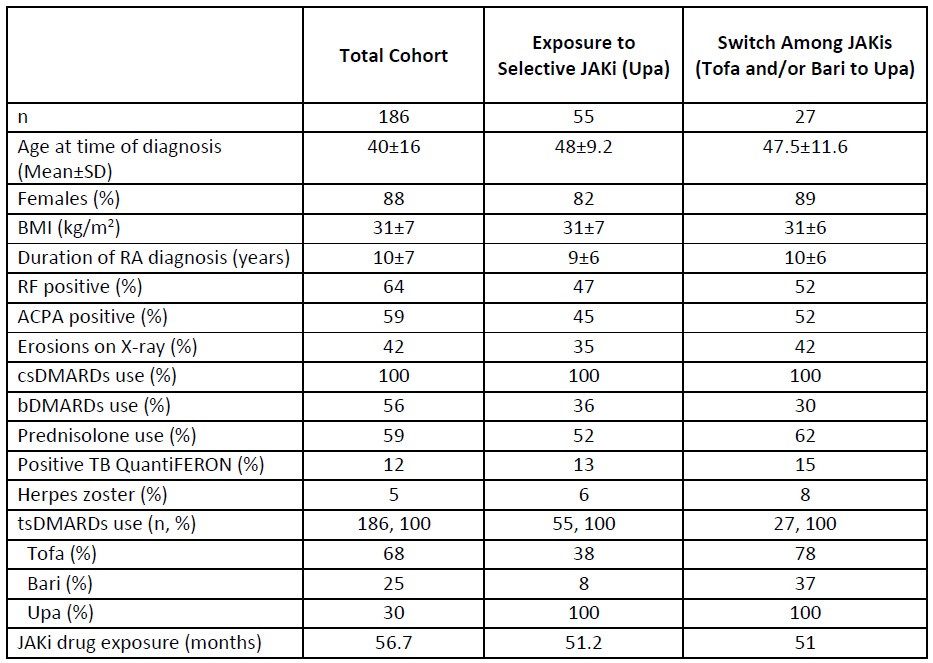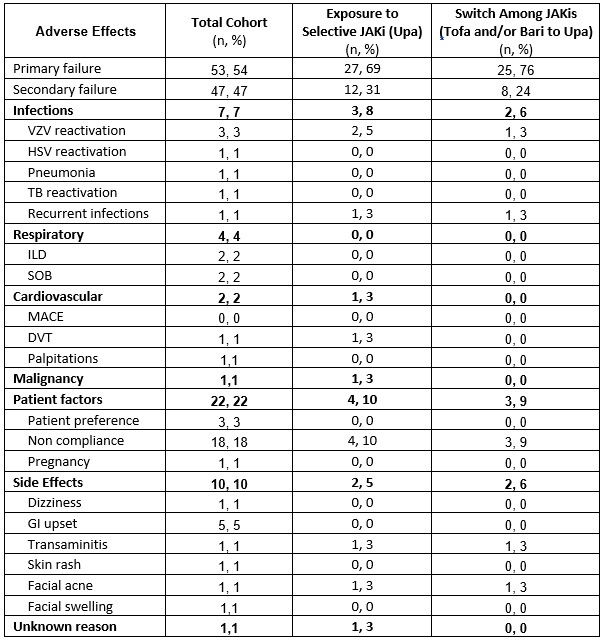Session Information
Session Type: Poster Session C
Session Time: 9:00AM-11:00AM
Background/Purpose: Rheumatoid arthritis (RA) is a chronic systemic inflammatory disease. Strategies for addressing treatment failure with TNF inhibitors according to the recent EULAR recommendations include switching to an alternate TNF inhibitor (known as “switching” or “cycling”) or moving to a different class of targeted agents with an alternative mechanism of action (“swapping”). Although efficacy data on switching from one TNFi after failure to another TNFi are available, information on switching from one JAK inhibitor (JAKi) to another JAKi is lacking and it is unclear whether cycling or swapping is preferable between JAKis. We evaluated the overall safety of JAKis in the Middle Eastern population, as well as the clinical efficacy of cycling from Tofacitinib (Tofa) or Baricitinib (Bari) to Upadacitinib (Upa).
Methods: Between May 2015 and May 2023, 186 patients with RA received Tofa, Bari, or Upa in any order in clinical practice at 3 centers (UAE, Saudi Arabia and Jordan). The drug retention rate, the drug’s safety, and the reason for switching due to ineffectiveness or an adverse event were all obtained. We compared the efficacy of switching from a non-selective JAKi to a more selective JAKi in terms of CDAI, DAS28 ESR and CRP evolution over the course of 6 months after starting the second treatment. Unpaired t test was used for comparison of disease activity. The level of significance was p < 0.05.
Results: 186 patients were exposed to Tofa, Bari and Upa (67%, 25% and 30% respectively). The mean age at the time of RA diagnosis was 40±16 (Mean±SD) years, with a BMI of 31±7 kg/m2, and a disease duration of 10±7 years. At baseline, the most common comorbidities were hypertension, dyslipidemia, and diabetes (30%, 33% and 26% respectively). Prior to starting any JAKi, there was a history of cardiovascular disease (10%) and cancer (6%). 3% had a previous history of varicella zoster (VZV) infection. All patients had previously received csDMARD, however 56% received bDMARD and 59% received oral prednisolone. Mean drug retention for Tofa (27.7±21.9), Bari (17.3±14.4) and Upa (11.7±6.6) months. Of the 186 patients, 55 patients (30%) were exposed to Upa. 6% had a previous history of VZV infection. Over the course of the 51.2 months of JAKi drug exposure, two patients developed VZV reactivation, one patient developed a DVT with no MACE. 27 patients out of the 55 exposed to Upa had prior use of Tofa or Bari. There were 31 instances of cycling among JAKis: 3 (Tofa to Bari), 18 (Tofa to Upa) and 9 (Bari to Upa). Over the course of the 51 months of JAKi drug exposure, 1 patient developed VZV reactivation (Tofa to Upa) with no reported DVT or MACE. Over a 6-month period, the switch to Upa was well tolerated and patients maintained a low disease activity response. Prior to switching from Tofa or Bari to Upa, the baseline CDAI, DAS-ESR, and CRP were (29.4±9.7, 5.5±1.1 and 4.6±0.9 respectively) and after 6 months were (6.7±5.3, 2.9±0.6 and 2.5±1.0 respectively; p value < 0.0001).
Conclusion: Our findings show that switching from non-selective JAKi to selective JAKi is feasible and safe, and that it may improve disease activity outcomes in patients who have failed to achieve low disease activity or remission with a previous JAKi.
To cite this abstract in AMA style:
Namas R, Alameri J, Al Qassimi S, Yu H, Elarabi M, Shatnawi H, Memisoglu L, Al Marzooqi A, Mubashir A, Mysler E. Safety and Effectiveness in Cycling Between Non-Selective and Selective JAKi in a Multi-Center Registry of Rheumatoid Arthritis in the Middle East [abstract]. Arthritis Rheumatol. 2023; 75 (suppl 9). https://acrabstracts.org/abstract/safety-and-effectiveness-in-cycling-between-non-selective-and-selective-jaki-in-a-multi-center-registry-of-rheumatoid-arthritis-in-the-middle-east/. Accessed .« Back to ACR Convergence 2023
ACR Meeting Abstracts - https://acrabstracts.org/abstract/safety-and-effectiveness-in-cycling-between-non-selective-and-selective-jaki-in-a-multi-center-registry-of-rheumatoid-arthritis-in-the-middle-east/



